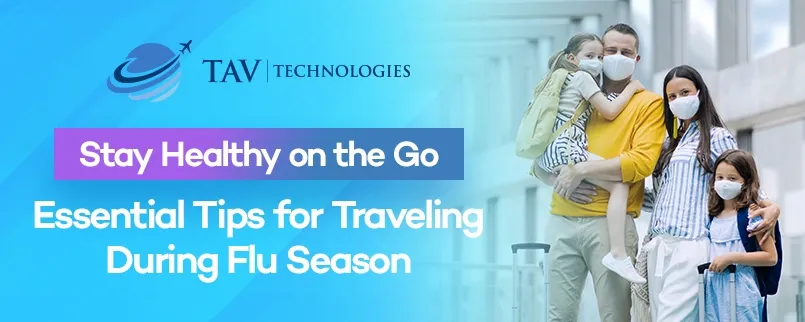
Feb 2025
Traveling is an exciting experience, but doing so during flu season can bring additional challenges. Airports, airplanes, and busy travel hubs often expose travelers to large crowds and shared surfaces, increasing the likelihood of encountering germs. However, with proper precautions and planning, you can minimize your risk of falling ill and enjoy your journey. Here are some essential tips to stay safe and healthy while traveling during flu season.
Get Vaccinated
One of the most effective ways to protect yourself during flu season is by getting a flu shot before you travel. According to the Centers for Disease Control and Prevention (CDC), the flu vaccine reduces the risk of flu illness by 40-60% during seasons when the vaccine viruses are well-matched to circulating viruses. Even if you do contract the flu, the vaccine can significantly reduce the severity of symptoms and help protect those around you. Most healthcare providers recommend getting vaccinated at least two weeks before your trip to allow your body enough time to build immunity.
Wear a Mask
Masks have become a widely recognized tool for reducing the spread of respiratory illnesses. The CDC reports that wearing a mask can reduce the spread of respiratory droplets, which are the primary mode of transmission for viruses like the flu. Studies show that masks can reduce exposure to respiratory droplets by 50-80%, especially in crowded or enclosed spaces like airport terminals or airplanes. Wearing a high-quality mask in these settings can significantly lower your risk of exposure to germs.
Stay Hydrated
Traveling can be dehydrating, especially on long flights. Dehydration can weaken your immune system, making you more susceptible to illness. Drink plenty of water throughout your journey and avoid excessive consumption of caffeine or alcohol, which can further dehydrate you. Research from the National Institutes of Health (NIH) highlights that even mild dehydration can impair physical performance, cognitive function, and immune response, making hydration a key factor in staying healthy.
Practice Good Hand Hygiene, Avoid Touching Your Face, and Disinfect Surfaces
Proper hand hygiene is your first line of defense against germs. Wash your hands frequently with soap and water for at least 20 seconds, especially after touching shared surfaces like handrails, security bins, or restroom door handles. If soap and water aren’t available, use a hand sanitizer with at least 60% alcohol. To further reduce your risk, avoid touching your eyes, nose, or mouth, as this is one of the easiest ways for germs to enter your body.
A study published in BioMed Central Infectious Diseases found that 10% of airport surfaces tested positive for respiratory viruses, with security bins being the most contaminated. Carry disinfectant wipes to clean high-touch surfaces like your airplane tray table, armrests, and seatbelt buckle. While many airlines provide wipes, it’s always a good idea to bring your own.
Be Prepared
Carrying a small health kit can help you stay ready for any situation during your travels. Pack essentials such as hand sanitizer and disinfectant wipes to keep your hands and surroundings clean, along with a thermometer to monitor any signs of fever. Having general cold and flu medications on hand can be useful in case you develop mild symptoms. Additionally, vitamins or immune-boosting supplements may support your body's natural defenses. Bringing extra masks and tissues ensures you are prepared for different environments and hygiene needs. By keeping these essentials within reach, you can travel with greater peace of mind and respond quickly to any health concerns.
Choose Less Crowded Travel Times
If your schedule allows, try to travel during off-peak hours or days. Airports and public transportation tend to be less crowded during weekdays or early mornings, reducing your exposure to large groups of people. By following these tips, you can significantly reduce your risk of illness and ensure a safer, healthier travel experience during flu season. Remember, a little preparation can go a long way in protecting yourself and those around you. Stay safe and enjoy your journey!
